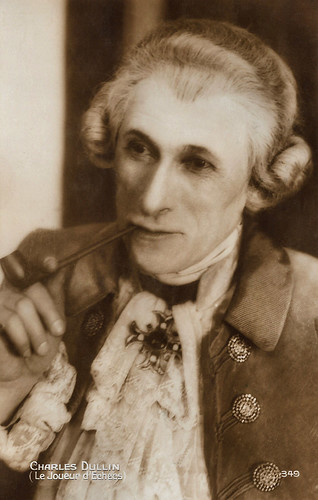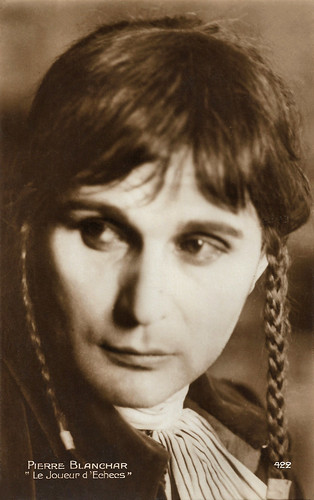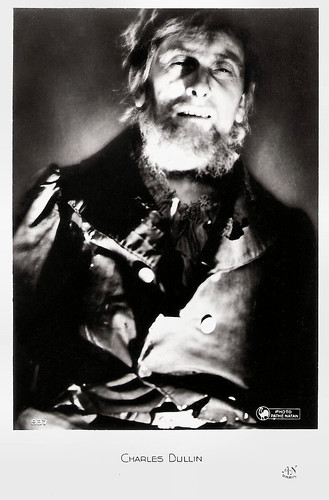Charles Dullin (1885-1949) was a French actor, theatre manager and director. He was an important figure in the French non-commercial theatre of the first half of the 20th century. He also appeared in many classics of the French silent cinema.

French postcard by Editions Cinémagazine, Paris, no. 349. Photo: publicity still for Le joueur d'échecs/The Chess Player (Raymond Bernard, 1927).
Charles Dullin was born in Yenne, Savoie in 1885. He was the youngest of a family of 19 children, a family devoted to traditional values.
Destined for a clerical career, Dullin knew his vocation was with the stage and at age 18, he travelled from Lyon to Paris, where he lived in the artist’s housing complex Le Bateau-Lavoir, together with artists such as Max Jacob, Mac Orlan, Harry Baur, Henri Matisse and Georges Braque. Like other artists, poverty, hunger, disease and money problems were normal to him.
After working at the Théâtre des Gobelins and the Lapin Agile, he shifted to the Théâtre de l'Odéon in 1906. His first role there was in William Shakespeare’s 'Julius Caesar', directed by André Antoine.
In 1908 he created his own company, then moved in 1910 to the Théâtre des Arts, directed by Jacques Rouché, where his role as Smerdjakov in 'The Brothers Karamazov' (dir. Jacques Copeau) furthered his fame.
When in 1913, Copeau opened the Vieux-Colombier theatre in the former Athenaeum-Saint-Germain, Dullin became his right hand, with Louis Jouvet as one of the principal actors. After the First World War, he travelled with Copeau to New York and then worked with Firmin Gémier.


Two French postcards by M. Le Deley, Paris. Photos: stills from Les Trois Mousquetaires/The Three Musketeers (1921), based on the famous novel by Alexandre Dumas père, and produced by Pathé Consortium Cinéma. Charles Dullin played Father Joseph.
In 1921 Charles Dullin opened his Théâtre de l'Atelier in Paris, where he pursued the lessons of Copeau, i.e. respect for the text, and the creation of stage actors. He staged modern playwrights like Luigi Pirandello and Marcel Achard, but also classic authors like William Shakespeare and Aristophanes.
While some shows were given to almost empty auditoria, plays like 'L’Avare' by Molière (1922) and 'Volpone' by Ben Johnson (1928; adapted by Jules Romains and Stefan Zweig) drew full houses. In 1927 Dullin joined the Cartel des Quatre, together with three other theatre managers: Louis Jouvet, Georges Pitoëff and Gaston Baty, who wanted to save the non-commercial theatre.
Between 1940 and 1947 Dullin was managing director of the Theatre de la Cité, the former Theatre Sarah Bernhardt, rebaptised during the war because of Bernhardt’s Jewish descent. It was here that Dullin staged Jean-Paul Sartre’s 'Les Mouches' (The Flies) in 1943, despite German censorship.
Because of his work during the war, Dullin was criticised afterwards. In 1947 he left the – debt-ridden - Theatre de la Cité and joined the Theatre de Montparnasse of his ex-pupil from l’ Atelier, Marguerite Jamois.
From the late 1930s on, Dullin was active in the movement of the 'decentralised popular theatre'. Among Dullin’s pupils were Antonin Artaud, Madeleine Robinson, Jean-Louis Barrault, Jean Marais, Roger Blin, Alain Cuny, Roland Petit, and Marcel Marceau.

Pierre Blanchar. French postcard by Cinémagazine-Edition, Paris, no. 422. Photo: publicity still for Le joueur d’échecs/The Chess Player (Raymond Bernard, 1927).
All this theatre activity did not stop Charles Dullin from acting in various films from the 1910s to the 1940s. After a bit part in the short Orgie romaine/Roman Orgy (Louis Feuillade, 1911), Dullin played in Âmes d’orient/Souls of The Orient (Léon Poirier, 1919-1922), Le secret de Rosette Lambert/The Secret of Rosette Lambert (Raymond Bernard, 1920), and the comedy L’Homme qui vendît son âme au diable/The Man Who Sold His Soul To The Devil (Pierre Caron, 1920).
In 1921 he appeared as Father Joseph in the 12-episode serial Les Trois Mousquetaires/The Three Musketeers (Henri Diamant-Berger, 1921), starring Aimé Simon-Girard. He had his breakthrough in silent cinema with the lead of Louis XI in the epic film Le miracle des loups/Miracle of the Wolves (Raymond Bernard, 1924), which contained spectacular battle scenes shot at Carcassonne. Dullin plays a skilful, intelligent and malicious French king who one by one manages to unite the different parts of France still occupied by the Burgundians and others.
His next role was that of Baron van Kempelen in Le joueur d’échecs/The Chess Player (Raymond Bernard, 1927), starring Pierre Blanchar and Edith Jéhanne. Dullin plays an 18th-century Austrian diplomat who supposedly has invented an automaton that plays chess. Inside a Polish resistance fighter (Blanchar) is hidden. The story was based on a real Baron van Kempelen and his chess-playing automaton with the shape of a Turk. Dullin then played the title role in Maldone/Misdeal (Jean Grémillon, 1928) opposite his wife, Marcelle Charles Dullin. The former runaway Maldone, now a well-to-do, cannot forget the attractive gipsy he met while wandering. When they meet again, he hits the road once more.
Dullin’s last silent role was in the German-French horror film Cagliostro (Richard Oswald, 1929), in which Hans Stüwe played Cagliostro. In the sound era, Dullin performed in Les Misérables (Raymond Bernard, 1934) starring Harry Baur, in L’affaire du courrier de Lyon/Courier of Lyons (Claude Autant-Lara, Maurice Lehmann, 1937), starring Pierre Blanchar; Mademoiselle docteur/Spies from Salonika (G.W. Pabst, 1937) starring Dita Parlo; and Volpone (Maurice Tourneur, 1941) starring, again, Harry Baur.
After the war, Dullin played in two more interesting films: the fantasy Les jeux sont faits/Second Chance (Jean Delannoy, 1947), written by Jean-Paul Sartre and starring Micheline Presle, and the excellent crime drama Quai des Orfèvres/Quay of the Goldsmiths (Henri-Georges Clouzot, 1947), starring Louis Jouvet. Charles Dullin died in Paris in 1949. He was 64.

French postcard by A.N., Paris, no. 937. Photo: Pathé Natan. Charles Dullin as the evil Thénardier in Les Misérables (Raymond Bernard, 1934), starring Harry Baur as Jean Valjean and adapted from the often filmed novel by Victor Hugo.
Sources: Wikipedia (French, English and Dutch) and IMDb.
This post was last updated on 2 February 2024.

French postcard by Editions Cinémagazine, Paris, no. 349. Photo: publicity still for Le joueur d'échecs/The Chess Player (Raymond Bernard, 1927).
The stage as a vocation
Charles Dullin was born in Yenne, Savoie in 1885. He was the youngest of a family of 19 children, a family devoted to traditional values.
Destined for a clerical career, Dullin knew his vocation was with the stage and at age 18, he travelled from Lyon to Paris, where he lived in the artist’s housing complex Le Bateau-Lavoir, together with artists such as Max Jacob, Mac Orlan, Harry Baur, Henri Matisse and Georges Braque. Like other artists, poverty, hunger, disease and money problems were normal to him.
After working at the Théâtre des Gobelins and the Lapin Agile, he shifted to the Théâtre de l'Odéon in 1906. His first role there was in William Shakespeare’s 'Julius Caesar', directed by André Antoine.
In 1908 he created his own company, then moved in 1910 to the Théâtre des Arts, directed by Jacques Rouché, where his role as Smerdjakov in 'The Brothers Karamazov' (dir. Jacques Copeau) furthered his fame.
When in 1913, Copeau opened the Vieux-Colombier theatre in the former Athenaeum-Saint-Germain, Dullin became his right hand, with Louis Jouvet as one of the principal actors. After the First World War, he travelled with Copeau to New York and then worked with Firmin Gémier.


Two French postcards by M. Le Deley, Paris. Photos: stills from Les Trois Mousquetaires/The Three Musketeers (1921), based on the famous novel by Alexandre Dumas père, and produced by Pathé Consortium Cinéma. Charles Dullin played Father Joseph.
Full houses
In 1921 Charles Dullin opened his Théâtre de l'Atelier in Paris, where he pursued the lessons of Copeau, i.e. respect for the text, and the creation of stage actors. He staged modern playwrights like Luigi Pirandello and Marcel Achard, but also classic authors like William Shakespeare and Aristophanes.
While some shows were given to almost empty auditoria, plays like 'L’Avare' by Molière (1922) and 'Volpone' by Ben Johnson (1928; adapted by Jules Romains and Stefan Zweig) drew full houses. In 1927 Dullin joined the Cartel des Quatre, together with three other theatre managers: Louis Jouvet, Georges Pitoëff and Gaston Baty, who wanted to save the non-commercial theatre.
Between 1940 and 1947 Dullin was managing director of the Theatre de la Cité, the former Theatre Sarah Bernhardt, rebaptised during the war because of Bernhardt’s Jewish descent. It was here that Dullin staged Jean-Paul Sartre’s 'Les Mouches' (The Flies) in 1943, despite German censorship.
Because of his work during the war, Dullin was criticised afterwards. In 1947 he left the – debt-ridden - Theatre de la Cité and joined the Theatre de Montparnasse of his ex-pupil from l’ Atelier, Marguerite Jamois.
From the late 1930s on, Dullin was active in the movement of the 'decentralised popular theatre'. Among Dullin’s pupils were Antonin Artaud, Madeleine Robinson, Jean-Louis Barrault, Jean Marais, Roger Blin, Alain Cuny, Roland Petit, and Marcel Marceau.

Pierre Blanchar. French postcard by Cinémagazine-Edition, Paris, no. 422. Photo: publicity still for Le joueur d’échecs/The Chess Player (Raymond Bernard, 1927).
A skilful, intelligent and malicious French king
All this theatre activity did not stop Charles Dullin from acting in various films from the 1910s to the 1940s. After a bit part in the short Orgie romaine/Roman Orgy (Louis Feuillade, 1911), Dullin played in Âmes d’orient/Souls of The Orient (Léon Poirier, 1919-1922), Le secret de Rosette Lambert/The Secret of Rosette Lambert (Raymond Bernard, 1920), and the comedy L’Homme qui vendît son âme au diable/The Man Who Sold His Soul To The Devil (Pierre Caron, 1920).
In 1921 he appeared as Father Joseph in the 12-episode serial Les Trois Mousquetaires/The Three Musketeers (Henri Diamant-Berger, 1921), starring Aimé Simon-Girard. He had his breakthrough in silent cinema with the lead of Louis XI in the epic film Le miracle des loups/Miracle of the Wolves (Raymond Bernard, 1924), which contained spectacular battle scenes shot at Carcassonne. Dullin plays a skilful, intelligent and malicious French king who one by one manages to unite the different parts of France still occupied by the Burgundians and others.
His next role was that of Baron van Kempelen in Le joueur d’échecs/The Chess Player (Raymond Bernard, 1927), starring Pierre Blanchar and Edith Jéhanne. Dullin plays an 18th-century Austrian diplomat who supposedly has invented an automaton that plays chess. Inside a Polish resistance fighter (Blanchar) is hidden. The story was based on a real Baron van Kempelen and his chess-playing automaton with the shape of a Turk. Dullin then played the title role in Maldone/Misdeal (Jean Grémillon, 1928) opposite his wife, Marcelle Charles Dullin. The former runaway Maldone, now a well-to-do, cannot forget the attractive gipsy he met while wandering. When they meet again, he hits the road once more.
Dullin’s last silent role was in the German-French horror film Cagliostro (Richard Oswald, 1929), in which Hans Stüwe played Cagliostro. In the sound era, Dullin performed in Les Misérables (Raymond Bernard, 1934) starring Harry Baur, in L’affaire du courrier de Lyon/Courier of Lyons (Claude Autant-Lara, Maurice Lehmann, 1937), starring Pierre Blanchar; Mademoiselle docteur/Spies from Salonika (G.W. Pabst, 1937) starring Dita Parlo; and Volpone (Maurice Tourneur, 1941) starring, again, Harry Baur.
After the war, Dullin played in two more interesting films: the fantasy Les jeux sont faits/Second Chance (Jean Delannoy, 1947), written by Jean-Paul Sartre and starring Micheline Presle, and the excellent crime drama Quai des Orfèvres/Quay of the Goldsmiths (Henri-Georges Clouzot, 1947), starring Louis Jouvet. Charles Dullin died in Paris in 1949. He was 64.

French postcard by A.N., Paris, no. 937. Photo: Pathé Natan. Charles Dullin as the evil Thénardier in Les Misérables (Raymond Bernard, 1934), starring Harry Baur as Jean Valjean and adapted from the often filmed novel by Victor Hugo.
Sources: Wikipedia (French, English and Dutch) and IMDb.
This post was last updated on 2 February 2024.
No comments:
Post a Comment